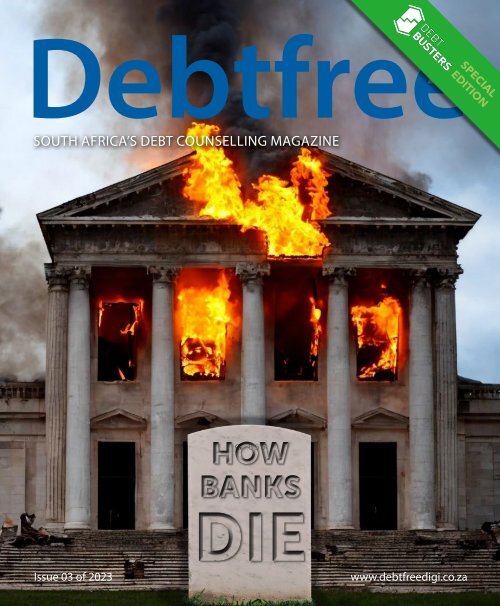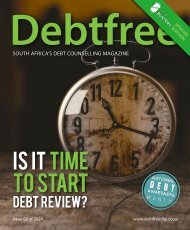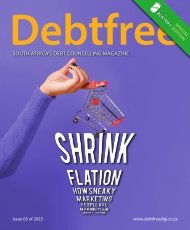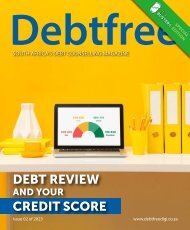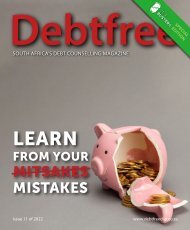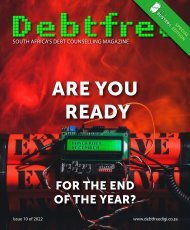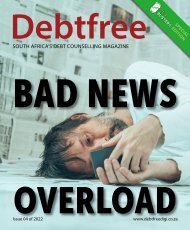Debtfree Issue 202303 - DB SE
You also want an ePaper? Increase the reach of your titles
YUMPU automatically turns print PDFs into web optimized ePapers that Google loves.
SPECIAL<br />
EDITION<br />
HOW<br />
BANKS<br />
DIE<br />
<strong>Issue</strong> 03 of 2023
EXCELLENCE IS DOING<br />
ORDINARY THINGS<br />
EXTRAORDINARILY<br />
WELL<br />
– John W. Gardner
WHAT MAKES US<br />
EXCELLENT?<br />
/ Unimpaired and automated PDA systems<br />
/ Integration with top-ranked Debt Counsellor systems<br />
/ Best customer support in the country – queries are resolved within 24 hours<br />
/ Strong compliance and best-industry-practice implementation is at our centre<br />
Call Saishen Krishnan<br />
Head of Hyphen PDA | 071 884 7300<br />
Or call our friendly support centre on 011 303 0060 - Option 2<br />
or visit our website www.hyphenpda.co.za
FROM THE EDITOR<br />
For hundreds of years, Swiss banks have been the<br />
“golden child” of banking. They had a reputation<br />
for being the safest place to keep your money.<br />
Through wars and regime changes, plagues and<br />
pandemics, they have stood bastions of banking.<br />
This month that illusion was shattered. And with it we are forced<br />
to realise that banks are just businesses too, and face external and<br />
internal pressures that can derail them. That’s not to say we have<br />
never seen banks collapse. We have, but those banks seemed<br />
reckless and unstable compared to the famous Swiss bank.<br />
It’s been a real eye opener for many people. Banks and banking<br />
have always been something of a shadowy world. Not that banks<br />
are hiding anything sinister, but how they operate is not simple and<br />
most of us were never taught at school about how banks work or<br />
how they could fail.<br />
In this issue we take a bit of a peek below the hood to see how the<br />
banks make their money and how they lose it. We consider what<br />
can be learnt from the current banking crisis that is spilling across<br />
the globe, and we discuss how it will impact us.
FROM THE EDITOR<br />
We also talk about trust, trust is not easily given. So, it can be<br />
hard when you enter debt review and are asked to trust a Debt<br />
Counsellor. We discuss some situations that can test our trust,<br />
and how we can think about things and know who to trust in<br />
that moment.<br />
If you are looking for a Debt Counsellor, Attorney, PDA or credit<br />
provide then head to our service directory section. We also have<br />
other news and great advice. Is it a good idea to pawn your car<br />
with one of those deals where you still get to drive the car? Well,<br />
we talk about that and other tips and tricks.<br />
In 2020 we learned that pandemics can happen overnight. In<br />
2021 we learned that even the American political system can face<br />
a coup. In 2022 we learned that war can break out in the most<br />
unexpected places, and this year we are fast learning that the<br />
institutions we think are so stable, are also open to system shock.<br />
In the midst of all that uncertainty, what can we rely on? Not, Swiss<br />
banks. No but, hopefully you can rely on your family and friends.<br />
You can also rely on prices to increase and your salary to feel like it<br />
is shrinking. You can also rely on debt making you feel stressed and<br />
bad. So, trust those helping you and carry on paying off your debts<br />
as fast as you can. That way you can say you are debt free.
FROM THE<br />
DESK<br />
AMENDMENTS TO THE<br />
NATIONAL CREDIT<br />
ACT COULD HELP<br />
MUNICIPALITIES AND<br />
SCHOOLS RECOVER<br />
BILLIONS<br />
Including municipal rates<br />
and school fees as part of<br />
debt restructuring would be<br />
a win-win for consumers,<br />
schools, municipalities.
Municipalities, schools and body corporates, amongst others, could<br />
see improvements in outstanding payments if adjustments were<br />
made to the National Credit Act to allow the restructuring of these<br />
debts in debt counselling.<br />
Municipal rates, levies, school fees, money owed to medical practices<br />
and attorneys and other similar debts fall outside of the National<br />
Credit Act as it currently stands. This means debt counsellors cannot<br />
renegotiate these debts.<br />
A Statistics SA report on civil cases for debt shows that consumers are<br />
increasingly tending not to repay this kind of debt.<br />
Summonses issued for debt relating to services, which comprise<br />
mainly municipal rates, increased by around 25% in November 2022<br />
both for businesses and individuals, compared to the same month<br />
in 2019. Comparative data for school fees and tuition, for the same<br />
periods, show increases of up to 33% for judgements.<br />
At the same time the volume of overall summonses have decreased.<br />
“It’s likely that some creditors are realising that getting a summons<br />
isn’t the most effective way of recovering what’s owed and financially<br />
stretched consumers are prioritising debtors who shout the loudest.<br />
Typically, these are businesses rather than schools and municipalities,<br />
which is why a lot more people are behind on repaying this kind of<br />
debt,” says Benay Sager, chairman of the National Debt Counsellors<br />
Association, of which DebtBusters is a member.<br />
The 2022 data was compared to 2019 as this is the first pre-Covid years.<br />
Data for 2020 and 2021 is not typical because of Covid-19.
It’s fair to assume that if summonses have increased by 25% over the<br />
past three years that the value of what’s owed has grown by the same<br />
proportion, he says.<br />
Debt counselling is a tried, tested and effective tool for consumers<br />
dealing with high debt levels. Evidence of this is the number of people<br />
to successfully complete debt counselling and get their clearance<br />
certificates, which has increased five-fold over the past six years.<br />
“We also know that from experience that when different debts are<br />
consolidated into a single monthly repayment, as they are in debt<br />
counselling, consumers have a higher repayment ratio because they<br />
don’t pick and choose which debt to repay.”<br />
The NDCA’s view is that including particularly rates and school fees<br />
when amendments to the National Credit Act are considered would<br />
be a win-win, both for consumers struggling with high debt burdens<br />
and debtors currently excluded such as schools and municipalities.<br />
“Expanding the NCA to allowing debt counsellors to renegotiate<br />
municipal rates and similar kinds of debt would be a more effective<br />
way for municipalities and others to recover the billions they’re<br />
currently owed.”
CONTENTS<br />
THIS IS HOW BANKS DIE<br />
LEARNING TO<br />
TRUST YOUR DEBT<br />
COUN<strong>SE</strong>LLOR<br />
SOCIAL MEDIA<br />
AND FEELING<br />
FOMO<br />
NEWS<br />
<strong>SE</strong>RVICE<br />
DIRECTORY<br />
DISCLAIMER<br />
<strong>Debtfree</strong> Magazine considers its sources reliable and verifies as<br />
much information as possible. However, reporting inaccuracies<br />
can occur, consequently readers using this information do so<br />
at their own risk. <strong>Debtfree</strong> Magazine makes content available<br />
with the understanding that the publisher is not rendering legal<br />
services or financial advice. Although persons and companies<br />
mentioned herein are believed to be reputable, neither<br />
<strong>Debtfree</strong> Magazine nor any of its employees, sales executives<br />
or contributors accept any responsibility whatsoever for their<br />
activities. <strong>Debtfree</strong> Magazine contains material supplied to<br />
us by advertisers which does not necessarily reflect the views<br />
and opinions of the <strong>Debtfree</strong> Magazine team. No person,<br />
organization or party can copy or re-produce the content<br />
on this site and/or magazine or any part of this publication<br />
without a written consent from the editors’ panel and the<br />
author of the content, as applicable. <strong>Debtfree</strong> Magazine,<br />
authors and contributors reserve their rights with regards to<br />
copyright of their work.
DEBT REVIEW<br />
Credit Providers often use outside<br />
companies to collect debts for them.<br />
This is why people will say things like:<br />
"I am calling on behalf of Bank X".<br />
If you are unsure who you are<br />
talking to then you can ask them<br />
directly for a name and ID Number<br />
or you can hang up and you can<br />
call the credit provider directly<br />
instead.
No more debt-stress.<br />
Let’s get it sorted.<br />
We’ll get your interest rates right down. You’ll<br />
make one consolidated payment a month. You’ll<br />
have more cash to live on. Your assets will be<br />
legally protected. Sorted.<br />
0861 365 910<br />
www.debtbusters.co.za<br />
info@debtbusters.co.za
THIS IS<br />
HOW<br />
BANKS<br />
DIE
DEBT REVIEW AND YOUR CREDIT SCORE<br />
BANKS CAN<br />
FAIL<br />
Banks are an essential part of our modern economy.<br />
It’s hard to imagine life without banks. They provide<br />
financial services to individuals, businesses, and<br />
governments. They are safe place to store your money,<br />
and a place to get credit when you need more than<br />
you have right now.<br />
Some banks are the biggest and most stable businesses in the entire<br />
world. Some have a bigger income than the countries that they<br />
operate in, they seem so stable.<br />
But, banks can and do collapse.<br />
Even though they seem so essential and stable, like any business,<br />
banks are not immune to failure, and the collapse of a bank can have<br />
serious consequences for the broader economy.<br />
Recently, many banks have found themselves in real trouble, some<br />
have collapsed under the pressure. Banks are in trouble!<br />
Let’s talk about why this is happening and look at some examples, like<br />
Lehman Brothers in 2008 and both Silicon Valley Bank, and Credit<br />
Suisse in 2023 to see how banks could die.
DEBT REVIEW AND YOUR CREDIT SCORE<br />
A DIFFICULT TIME<br />
FOR BANKS<br />
Banks are a safe place to keep your money. When you<br />
have money that you want to save, it is not a great<br />
idea to hide it under the mattress. Much better to take<br />
those funds to a bank, and pay to keep that money safe<br />
(and to have it insured).<br />
The banks, in turn, use that money to run their other business of<br />
investing and trading. They also use some of that money to give<br />
other people loans or credit. They charge interest and thereby make<br />
money.<br />
Because banks no longer have to have gold on hand to match what<br />
they lend out, governments and regulators demand that they at least<br />
have some money on hand (and insurance). The amount they are<br />
allowed to lend out is closely linked to how much they have saved<br />
with them.<br />
These days we all know, that it is hard to save. Very few people are<br />
able to save anything at all.<br />
Banks also have a lot of competition these days, more and more<br />
digital banks are entering the market. This means the banks are<br />
fighting over a small group of clients.
Even giving people credit, which is very profitable for banks, is<br />
becoming harder. These days, the banks have to check that you can<br />
actually afford to repay the money you borrow. They also have to<br />
double check the information you give them when you apply for<br />
credit.<br />
More than that, because so many people do not have jobs, they<br />
cannot really afford credit. Young people in particular are not getting<br />
work, thereby not qualifying for credit.<br />
This results in banks having less money saved with them, fewer<br />
clients, and are making less profit due to fewer people qualifying for<br />
credit.<br />
Banks are experiencing challenges that they have rarely seen before.
DEBT REVIEW AND YOUR CREDIT SCORE<br />
HOW BANKS MAKE<br />
MONEY<br />
You may wonder: How do banks<br />
make their money?<br />
It’s complicated. At its core, they make money<br />
by charging for services like protecting your<br />
money, and charging people who want to<br />
borrow money (eg. initiation fees and interest).<br />
Banks also have shareholders who buy into<br />
their bank, and thereby have a small say in<br />
how the bank is run, and get a bit of the profit<br />
when the bank is doing well.<br />
Investors may take on shares, or may invest in<br />
various types of bonds that the bank offers. This<br />
provides the bank with more money to use.<br />
Let’s dive a little into the mysterious way banks<br />
work, and look at what they do and see how<br />
that can leave them exposed. To start with<br />
let’s figure out what stocks and bonds are, and<br />
how securitisation works. Then let’s see how<br />
banks make money and how they can lose it.
DEBT REVIEW AND YOUR CREDIT SCORE<br />
SHAREHOLDERS VS BONDHOLDERS:<br />
WHAT’S THE<br />
DIFFERENCE?<br />
When you own a share in a bank, you are a<br />
shareholder. This means that you own a small piece of<br />
the bank, and you have a say in how the bank is run.<br />
You might get to vote on important decisions e.g. who sits on the<br />
bank’s board of directors. Shareholders also have the potential to<br />
make money if the bank’s stock price goes up, because they can sell<br />
their shares for a higher price than they paid.<br />
On the other hand, when you own a bond issued by a bank, you are<br />
a bond holder. This means that you have lent money to the bank and<br />
the bank has promised to pay you back with interest.<br />
Bonds are a type of loan that investors make to companies,<br />
governments or other organizations. The bondholder receives regular<br />
interest payments from the bank over a set period of time, and at the<br />
end of that period, the bank repays the initial amount of money that<br />
was borrowed.<br />
The main difference between a shareholder and a bond holder is the<br />
type of ownership they have in the bank.
DEBT REVIEW AND YOUR CREDIT SCORE<br />
WHAT ARE<br />
BONDS?<br />
No, not James Bond, the other bond.<br />
Think of bonds like loans that people or<br />
companies take out. When you buy a bond,<br />
you’re essentially lending money to the person<br />
or company (or bank) that issued the bond. In<br />
return, they promises to pay you the amount<br />
you loaned them, plus interest over a certain<br />
period of time.<br />
So, you lend them money now and you make<br />
a profit over time as they pay you back the<br />
loan amount with interest. It’s kind of how all<br />
credit works these days.<br />
Now, some bonds are considered riskier than<br />
others. For example, if you’re lending money<br />
to a company that’s struggling financially,<br />
there’s a higher chance that they might not be<br />
able to pay you back. So, if you invest in that<br />
risky company’s bonds, you might demand<br />
a higher interest rate to compensate for that<br />
risk.
Similarly, bonds with longer maturities (the<br />
length of time until the bond matures and<br />
the issuer pays back the loan) also tend to be<br />
riskier, since there’s more time for something<br />
to go wrong. So, investors might demand a<br />
higher interest rate on those bonds too.<br />
The price of a bond can vary depending on<br />
a few factors. For example, if interest rates<br />
in general are low, then investors might be<br />
willing to pay more for a bond that offers a<br />
higher interest rate.<br />
They want something that makes them more<br />
profit than just a boring savings account.<br />
Conversely, if interest rates go up, the price of<br />
existing bonds with lower interest rates might<br />
go down. This means those investments can<br />
lose money.<br />
So, to sum up: different bonds have different<br />
prices and risks because they represent loans<br />
to different borrowers with varying levels of<br />
financial health and different maturities. The<br />
returns on those bonds (the interest rates)<br />
reflect those risks, and can vary depending on<br />
market conditions.
DEBT REVIEW AND YOUR CREDIT SCORE<br />
<strong>SE</strong>CURITISATION<br />
WHAT IS IT?<br />
When you put your money in a bank,<br />
the bank uses that money to make<br />
loans and investments. Sometimes,<br />
the bank might take some of the<br />
loans and investments they’ve made<br />
and package them together into<br />
something called a "security".<br />
A security is basically a bundle of loans or<br />
investments that are sold to other people or<br />
organizations in order to raise money.<br />
For example, let’s say that a bank has made<br />
various home loans to clients. The bank might<br />
take a bunch of those loans and bundle them<br />
together into a security called a "mortgagebacked<br />
security". Then they will sell shares of<br />
that security to investors.<br />
When someone buys a share of a bank<br />
security, they become part-owner of that<br />
bundle of loans or investments. They’ll get
paid a share of the money that’s made from<br />
those loans or investments, either in the form<br />
of interest payments or dividends.<br />
Bank securities are just bundles of loans or<br />
investments that banks sell to investors as<br />
a way to raise money that they then use for<br />
other investments or costs.<br />
There have been many court cases about<br />
this topic and how securitisation impacts on<br />
who really owns consumer’s mortgages and<br />
who can collect on them when people miss<br />
payments. It can be somewhat mysterious and<br />
obscure.
DEBT REVIEW AND YOUR CREDIT SCORE<br />
BORROWING &<br />
LEVERAGING<br />
You “need money to make money”, the saying goes.<br />
One of the main reasons why banks collapse is<br />
because of their heavy reliance on borrowing money<br />
themselves, and then leveraging those funds to make<br />
money before they have to pay it back.<br />
Banks do not have vaults full of gold, like in the old days. In modern<br />
times money is mostly 1’s and 0’s on a computer. In fact, you might<br />
find that banks give people loans that are based almost totally on the<br />
promise of money that the client will eventually pay back. Still, banks<br />
are required to have at least some of the money they lend out or use.<br />
Banks borrow money from depositors (their savings clients) and other<br />
creditors and then in turn, they use that money to grant loans and<br />
investments. This process is known as leveraging, and it can amplify<br />
profits when things are going well.<br />
However, it can also magnify losses when things turn sour. Since<br />
banks have borrowed money, they also have to pay it back. To do that<br />
they need to be making a profit or to borrow even more money (from<br />
the reserve bank or investors) to make payments.<br />
Sound familiar? We all know how hard it can be to repay debts to lots<br />
of different people.
DEBT REVIEW AND YOUR CREDIT SCORE<br />
FAMOUS BANKS THAT HAVE COLLAP<strong>SE</strong>D<br />
LEHMAN BROTHERS<br />
Lehman Brothers is perhaps one of<br />
the most famous example of a bank<br />
collapse.<br />
At the time, it was the 4th biggest bank in the<br />
USA. By 2008, the investment bank had made<br />
a lot of money by investing in different things<br />
like stocks, bonds, and mortgages, but they<br />
had taken on a lot of debt to do so.<br />
Unfortunately, some of the investments that<br />
Lehman Brothers had made were in the overinflated<br />
US housing market. At that time, a lot<br />
of people, too many perhaps, had been given<br />
loans to buy houses, there was a false sense of<br />
euphoria in the market and many people were<br />
"flipping" house after house for a profit.<br />
Lehman Brothers took over many of these<br />
mortgages, then those people realised they<br />
had too much debt and couldn’t afford to<br />
repay them. As sales began to slow, the
problem got worse. As a result, a lot of houses<br />
went into foreclosure (then the property is<br />
repossessed). This caused the bank to end up<br />
with so many repossessed properties, and no<br />
one to buy them (because it had been over<br />
priced in the first place and because no one<br />
had any money to buy anything).<br />
When that happened, the value of those<br />
houses dropped suddenly, which meant that<br />
the investments Lehman Brothers had made<br />
in the housing market also lost value. This was<br />
a big problem for Lehman Brothers, because<br />
now they owed more money than they had,<br />
and they couldn’t repay it.<br />
As a result, the people and companies that<br />
had lent money to Lehman Brothers started<br />
worrying that they might not get their<br />
investments back. They started to pull their<br />
money out of the firm, which made it even<br />
harder for Lehman Brothers to pay off their<br />
debts. Eventually, the firm had to file for<br />
bankruptcy.<br />
That triggering a global financial crisis among<br />
banks and other investment firms that had all<br />
done the same, it was chaos!<br />
We are still feeling the effects decades later.<br />
Photo by David Shankbone used under Creative Commons Licence
DEBT REVIEW AND YOUR CREDIT SCORE<br />
FAMOUS BANKS THAT HAVE COLLAP<strong>SE</strong>D<br />
SAAMBOU<br />
Saambou Bank, was a local South<br />
African bank founded in 1942. In<br />
1970 it merged with Nasionale<br />
Bouvereniging. They went public<br />
in 1987 and traded under the name<br />
Saambou Bank.<br />
Saambou Bank was eventually the 6th biggest<br />
bank in SA, and focused on personal loans<br />
and mortgages to individuals. The bank<br />
experienced financial difficulties in the early<br />
2000s, and ultimately filed for bankruptcy<br />
in 2002.<br />
One of the reasons Saambou Bank<br />
experienced financial difficulties was because<br />
they lent money to high risk customers (kind<br />
of how African Bank did). This meant that<br />
the bank charged higher interest rates to<br />
compensate for the risk, which made their<br />
loans more expensive than those of their<br />
competitors.
Like Lehman Brothers, who would fall not<br />
too long after, the bank invested heavily in<br />
property and suffered losses when the local<br />
property market went down. As a result, the<br />
bank didn’t have enough cash to repay their<br />
debts.<br />
The bank went into bankruptcy in 2002 after<br />
newspaper articles appeared about it being<br />
bankrupt and customers withdrew R1 billion in<br />
just two days. Trading stopped and eventually<br />
First National Bank took over some of its<br />
business.<br />
Fortunately, many smaller clients eventually<br />
got some of their savings out of the bank but<br />
the bank itself was done and was liquidated<br />
in 2006. A dividend of R7.568 billion, or 4.53c<br />
per share, was paid out to shareholders (the<br />
share had traded at 203c per share before the<br />
bankruptcy).
DEBT REVIEW AND YOUR CREDIT SCORE<br />
FAMOUS BANKS THAT HAVE COLLAP<strong>SE</strong>D<br />
SILICON VALLEY BANK<br />
Another example of a bank that suddenly got into<br />
trouble is Silicon Valley Bank. They specialised in<br />
investing in and assisting tech companies. In 2023,<br />
the bank was hit hard by a series of high-profile tech<br />
company failures.<br />
Many of those companies dealt in cryptocurrency. When the value<br />
of crypto fell suddenly towards the end of the pandemic, so did the<br />
value of those businesses. As their values dropped, people stopped<br />
investing in them, and those firms could not pay back what they<br />
owed the bank or to save money in the bank like they had in the past.<br />
As a result, SVB suffered significant losses on its loans to these<br />
companies. Once people heard the bank wasn’t making as much<br />
profit, they began to quickly withdraw savings and investments in the<br />
bank, and this made other investors and clients nervous, the result<br />
was a "run on the bank".
Photo by Minh Nguyen used under Creative Commons Licence
DEBT REVIEW AND YOUR CREDIT SCORE<br />
FAMOUS BANKS THAT HAVE COLLAP<strong>SE</strong>D<br />
CREDIT SUIS<strong>SE</strong><br />
When you were young, you probably<br />
heard of spies or criminals who<br />
banked in Switzerland. It was long<br />
considered the safest place to bank<br />
on the planet. One of the 30 most<br />
stable banks in the work was based<br />
in Switzerland for the last 160 years<br />
and was called Credit Suisse.<br />
What happened to Credit Suisse is very<br />
interesting, the bank had been having issues<br />
in the background, and was exposed to<br />
some financial losses due to bad deals and<br />
investments in the UK and USA.<br />
They had also been issued big fines and<br />
recently many clients had been withdrawing<br />
funds (for a variety of reasons). This meant the<br />
bank had to ask one of its newest investors for<br />
more money. When they said no, things came<br />
to a head.
Even though the bank had lots of assets and<br />
plenty money in the vaults, the market was<br />
very nervous after the demise of two big<br />
American banks (one of them being Silicone<br />
Valley Bank) and reacted with panic. This sent<br />
the bank’s shares into freefall, losing 30%<br />
value in one day.<br />
That huge and sudden drop made investors<br />
and other clients panic even more! Eventually,<br />
the Swiss banking regulators had to get<br />
involved and brokered a big deal to get<br />
another bigger bank to buy them.<br />
The buy-out deal had some unusual decisions<br />
that have made certain types of bond holders<br />
worldwide very angry and others very nervous.<br />
That chaos is still going on.<br />
Photo by Roland zh used under Creative Commons Licence
DEBT REVIEW AND YOUR CREDIT SCORE<br />
WHAT IS A<br />
"RUN ON THE BANK"?<br />
When news gets out that a bank’s share prices are<br />
dropping, or that some of their investment plans are<br />
not working out as expected, this can make their<br />
clients begin to panic, causing what is known as a run<br />
on the bank.<br />
A "run on the bank" happens when many people all start to worry<br />
that a bank might not have enough money to give back to all of its<br />
customers. They try to withdraw all of their money at the same time,<br />
which can cause big problems for the bank. Often the situation will<br />
snowball from just a few nervous clients, then a few more, then more<br />
and more as the panic spreads.<br />
When too many people try to take out their money all at once, it can<br />
cause the bank to run out of cash. That’s because banks usually keep<br />
only a small amount of their customers’ money on hand, and loan<br />
out the rest to other people or invest it in different ways. If too many<br />
people try to take their money at once, the bank might not be able to<br />
get enough cash in fast enough to return it to everyone.<br />
This can be a big problem because it can cause a bank to go<br />
bankrupt. If a bank runs out of money, it really can’t pay back all of its<br />
customers, and that can lead to a chain reaction of financial problems<br />
for everyone involved. No wonder people panic.
DEBT REVIEW AND YOUR CREDIT SCORE<br />
AS SAFE AS A<br />
SWISS BANK<br />
Recent years have shown that, like any business, banks<br />
can fail. Bankers are some of the smartest people in<br />
dealing with money and investing money but even<br />
they are effected by what is happening around the<br />
world. The world is an unstable and complicated place.<br />
If someone in China gets flu, it can cause the world to go into<br />
lockdown for years. We now have massive and destructive storms<br />
and weird fire tornadoes and that’s before you consider the impact of<br />
wars and climate migration.<br />
Things like the creation of cryptocurrency and even digital banking<br />
have had massive impacts on traditional banking and the profits<br />
banks can make. A shrinking base of new clients, new investors and<br />
a drought of people with money to deposit is putting banks under<br />
pressure. When government agencies like the US Fed or SA Reserve<br />
Bank put up the Repo Rate, this makes it even more expensive for<br />
banks to borrow money or make money on existing investments.<br />
Even the failure of other banks like SVB or Credit Suisse or when<br />
bond holders don’t get paid out when things go wrong means that it<br />
influence other banks to borrow money or insure their money. That in<br />
turn puts all banks under strain, and makes it harder for them to make<br />
a profit.
DEBT REVIEW AND YOUR CREDIT SCORE<br />
BANKS CAN<br />
DIE<br />
Banks need our money to make money. They have<br />
investors who give them money, but only if the bank<br />
will make them a good return on their investment.<br />
Global markets and global conditions are hard to predict, thereby<br />
making consistent profit from investments almost impossible.<br />
These days, investors are fickle and only want the most profitable<br />
investments.<br />
Investing has always been volatile and with the increases in<br />
government regulation and the incredible speed of communication, it<br />
is harder and harder to hide even the smallest financial difficulties and<br />
it has become harder to keep investors calm.<br />
These days fickle, nervous, demanding investors and easily panicked<br />
clients can quickly withdraw their support and their cash in just<br />
minutes. Runs on the bank are becoming more common.<br />
The picture of the banks being too big to fail has truly been shattered.<br />
We now live in the time when banks can easily die.
LEARNING<br />
TO TRUST<br />
YOUR DEBT<br />
COUN<strong>SE</strong>LLOR
LEARNING TO TRUST YOUR DC<br />
TRUST MUST BE<br />
EARNED<br />
As children we first learn to trust our<br />
parents. We develop this trust based<br />
on their loving attention and care<br />
for us, they feed us, come when we<br />
call and catch us when we fall. They<br />
provide a basis for all our future<br />
dealings with other people.<br />
Then later, as we age, we learn to trust our<br />
friends, our friends’ parents and our teachers.<br />
Along the way, we also learn who not to trust.<br />
We get hurt, tricked and lied to. People break<br />
our heart and our trust. We make deals and<br />
agreements with people and they don’t stick<br />
to their side of the bargain.<br />
This is why trust has to be earned.
LEARNING TO TRUST YOUR DC<br />
WHEN TIMES ARE<br />
HARD<br />
They say: when days are dark friends<br />
are few.<br />
Perhaps you have experienced this when you<br />
hit hard financial times. Some of your friends<br />
disappeared and sometimes institutions you<br />
have banked with for years and years suddenly<br />
turned on you and set their collections agents<br />
on you.<br />
This behaviour hurts your feelings and breaks<br />
trust.<br />
If your financial situation becomes very<br />
difficult to deal with, then getting professional<br />
advice is a good idea. Turning to NCR<br />
registered Debt Counsellors who are trained<br />
to help can be just what you need.
LEARNING TO TRUST YOUR DC<br />
GETTING<br />
HELP<br />
The process of finding the right Debt<br />
Counsellor is an important one, and<br />
there are many factors which you<br />
should take into account. You need<br />
to find the right person to help.<br />
Do your homework before you commit. Ask<br />
to see the NCR certificate from whoever you<br />
talk to, and make good choices!<br />
When you do eventually find the right person<br />
to help, and you sign those forms and send in<br />
all your information and get that form 17.1 that<br />
says you have applied for debt review, it can<br />
feel like a huge weight has been lifted from<br />
our shoulders.<br />
Now instead of trying to deal with all the<br />
stress and challenges on your own, you<br />
now have somebody, who can be trusted, in<br />
your corner. They help to put an end to the<br />
persistent collections calls, ease your fear of<br />
the Sherriff showing up at your door to take
all your stuff, and you no longer have to be<br />
scared of letters of demand in the post of by<br />
email.<br />
But…<br />
The challenge is that you suddenly have<br />
to trust this individual or debt counselling<br />
practice a lot. Your entire financial future<br />
depends on it.<br />
Also, the Debt Counsellor is going to be<br />
asking you to make some big changes. What<br />
you were doing, was not working, so it’s time<br />
to make a change.<br />
You might be asked to stick to a new,<br />
improved budget. You may be advised about<br />
where and how to bank. You might need to<br />
make serious changes to your life - maybe<br />
where you live or how you live, in order to<br />
cover the debt repayments.<br />
All this is hard.
LEARNING TO TRUST YOUR DC<br />
TRUSTING<br />
THE PLAN<br />
Other than a new budget, you will<br />
also be presented with a whole new<br />
plan on how to settle your debts.<br />
Normally, that new plan and repayment<br />
figure is much more manageable than before<br />
(maybe even half of what you used to pay).<br />
And what’s more, in a few years, if you stick to<br />
the plan, your debts will be totally gone.<br />
Amazing!<br />
But the snag is that for a long time you have<br />
been making your own plans. You have been<br />
doing whatever you want, and now you are<br />
asked to stick closely to this tight budget<br />
and to make payments every month without<br />
missing a month.<br />
This is a big change to how you may have<br />
done things before.
LEARNING TO TRUST YOUR DC<br />
PAYING THE<br />
MONEY<br />
Debt Counsellors never actually<br />
touch your money. They help to<br />
structure the plan for the courts and<br />
they give instructions to the people<br />
who do handle the money, but they<br />
never touch it themselves.<br />
The National Credit Regulator has registered<br />
4 companies who handle the payment side<br />
of debt review. You make one payment to<br />
them, and then they split up the money and<br />
distribute it on the right day, to the right<br />
account, using the right references. These<br />
companies are the Payment Distribution<br />
Agencies or PDAs.<br />
So, you deposit money into this new account,<br />
or set up the debit, and you have to trust that<br />
your money will get to your credit providers.
LEARNING TO TRUST YOUR DC<br />
IT’S HARD TO TRUST A<br />
STRANGER<br />
Even if we have done our<br />
homework, and even if we know<br />
that the person who is helping us is<br />
a professional Debt Counsellor with<br />
a good reputation, it takes a lot of<br />
trust to allow a relative stranger to<br />
tell you how to live and what to do.<br />
We listen because we are desperate, and the<br />
situation is out of control as is. Surely anything<br />
is better than living like that.<br />
But the truth is that we have had limited<br />
dealings with this new person and with the<br />
entire debt review process and the debt<br />
counselling practice so we might find it<br />
hard to trust when certain situations arise,<br />
especially at first.<br />
Let’s briefly look at some things that might test<br />
our trust and make us second guess the debt<br />
review process or Debt Counsellor.
LEARNING TO TRUST YOUR DC<br />
THE COLLECTION<br />
CALL<br />
You may get a call from a collections<br />
agent who wants money. You calmly<br />
tell them that you are under debt<br />
review and they must talk to your<br />
Debt Counsellor.<br />
It gives us a feeling of satisfaction after all<br />
those pesky calls to finally be able to tell<br />
someone essentially: “talk to my lawyer”. You<br />
will probably feel vindicated that you have the<br />
situation under control.<br />
But the collections agent might say something<br />
to the effect that debt review isn’t showing on<br />
their system, or that the payments you have<br />
made are not reflecting.<br />
Immediately your feeling of comfort is<br />
shattered, you may begin to panic.
Here are some things to keep in mind:<br />
They may call right at the start of the process<br />
when you’ve only paid money through the PDA<br />
once or twice. Debt review is a legal process<br />
and all your credit providers know that in<br />
month 1 and 2, your payment amount is set<br />
aside to cover professional fees for the Debt<br />
Counsellor, and your attorney. This is normal.<br />
If someone says they are calling from the<br />
“bank” and they are not getting any money,<br />
stop and think about it. How can that be? You<br />
know you paid. You know that the National<br />
Credit Regulator checks on the 4 registered<br />
PDAs each quarter and audits them regularly.<br />
Also, you know that the Debt Counsellor<br />
doesn’t touch the money so, they are not<br />
stealing it.<br />
You are probably dealing with a collections<br />
agent, who works for commission based on<br />
however much they can get people to pay<br />
immediately. This can motivate them to say<br />
things that are less than accurate.<br />
Don’t stop trusting your NCR registered Debt<br />
Counsellor because of a 2 minute phone<br />
call from a stranger. That would be foolish,<br />
rather get all the facts and speak to your Debt<br />
Counsellor before doing anything rash.
LEARNING TO TRUST YOUR DC<br />
WHEN YOUR DEBT<br />
COUN<strong>SE</strong>LLOR IS NOT GREAT<br />
AT COMMUNICATING<br />
It can be stressful if your Debt<br />
Counsellor is not great at<br />
communicating.<br />
Good Debt Counsellors will keep in regular<br />
contact with you, and make sure you get<br />
updates about the process.<br />
Some Debt Counsellors are however, not that<br />
great at staying in touch, and not that great at<br />
keeping you updated.<br />
If they are bad at communicating with you<br />
then… improve your communication with<br />
them. Be specific and explain the situation in<br />
a detailed way that makes what you need and<br />
want very clear. Don’t give up on the process<br />
because they are very busy and take a while to<br />
return your calls or emails.<br />
Pester them if you must, but stay in touch and<br />
always let them know if you change email<br />
address or phone numbers.
LEARNING TO TRUST YOUR DC<br />
A MISLEADING<br />
STATEMENT<br />
What if you get a statement from your creditor that<br />
shows you owe more money than before?<br />
What if you have been paying for a while, and the debt is not<br />
getting considerably smaller? Should you start to doubt your Debt<br />
Counsellor?<br />
It is important to realise that because your creditor charges interest,<br />
each month your debt can grow if you pay less than the amount of<br />
monthly interest.<br />
Normally, this will not be part of your debt repayment plan. It is very<br />
unlikely.<br />
Right at the start of the process however, you will cover the Debt<br />
Counsellor’s fee and the attorney’s fees in month 1 and 2. This means<br />
that your debts might climb slightly those first two months.<br />
Still, if you see a balance going up, you should definitely talk to your<br />
Debt Counsellor because maybe the credit provider has not updated<br />
their computer system to reflect the correct figures under debt<br />
review.
LEARNING TO TRUST YOUR DC<br />
DEBT SHRINKING TOO<br />
SLOWLY<br />
If you have been paying for around two years and you<br />
are seeing that the debt is taking a long time to reduce,<br />
you may begin to feel your Debt Counsellor is not<br />
doing their job. You begin to lose trust in them.<br />
Before you decide to do anything drastic, go have a look at the<br />
official court order for debt restructuring (ask for it, if you don’t have<br />
a copy). The court order shows you how many months each debt will<br />
take to be paid off at the new arrangements. Often these plans are set<br />
out over 60 months (or 5 years).<br />
Debt review is often designed so that all your credit providers get paid<br />
a fair amount each month. This can mean that even accounts with<br />
small balances take a long time to get paid because they only receive<br />
small monthly payments. If you are able to, then you can help speed<br />
things up and begin to settle your debts sooner. How?<br />
If you are able to pay off a small debt, then funds that were being<br />
allocated to that account can now be shifted to another small debt.<br />
This can settle that debt faster too. And so, more funds can be<br />
allocated to another account, this snowball effect can make a big<br />
difference.
LEARNING TO TRUST YOUR DC<br />
LEARN WHO TO<br />
TRUST<br />
Most important is to get to know<br />
more about the debt review process<br />
and how it works. Educate yourself.<br />
Get to know more about your Debt<br />
Counsellor. Don’t let them be a<br />
mystery to you.<br />
TRUS<br />
DE<br />
COUN<br />
Learn their name, their email address. Learn<br />
where your Debt Counsellor’s offices are, who<br />
works there, go visit them or interact with<br />
them regularly.<br />
This will build your trust in these professional<br />
strangers, who are helping you get out of a<br />
bad situation.
T YOUR<br />
BT<br />
<strong>SE</strong>LLOR
LEARNING TO TRUST YOUR DC<br />
LEARN WHO NOT TO<br />
TRUST<br />
Please beware of trusting a total<br />
stranger who calls and says strange<br />
things about your debt review that<br />
may not be true.<br />
Also please beware of anyone who calls you<br />
and says that you can get out of debt review<br />
sooner… as long as you pay money into a<br />
different bank account.<br />
Always contact your Debt Counsellor if you<br />
get a call like that. It might be a scammer who<br />
wants you to pay money into their account,<br />
guess what happens if you do that… nothing<br />
good.<br />
If you have doubts or concerns about<br />
anything during the debt review process, go<br />
to your Debt Counsellor and discuss matters<br />
with them.<br />
Beware of strangers and learn to trust your<br />
Debt Counsellor.
DEBT REVIEW<br />
Because debt review is a legal<br />
process that happens via the<br />
courts there is no benefit to talking<br />
to collections agents and credit<br />
providers on the phone. It is<br />
a waste of time.<br />
It is better if they send court<br />
documents to your attorneys<br />
or submit those documents<br />
to the courts.
FREE BOOKLET<br />
TO DOWNLOAD AND SHARE<br />
How do you leave Debt Review?<br />
How do you have the Credit Bureau remove<br />
the Debt Review listing on your credit report?<br />
Leaving Debt Review Is Not As Simple As To Simply Stop Paying.<br />
Consumers can only leave the debt review process at certain times<br />
and in certain ways.<br />
This free e book will help you navigate this process and avoid many<br />
of the common mistakes people make when wanting to leave debt<br />
review.<br />
If you are curious about how you can leave debt review properly and<br />
with no risk to your assets then be sure to download and read this<br />
free booklet<br />
DOWNLOAD AND SHARE
SOCIAL<br />
MEDIA AND<br />
FEELING<br />
FOMO
SOCIAL MEDIA AND FEELING FOMO<br />
THE DANGER OF<br />
SOCIAL MEDIA<br />
We all love social media. It might<br />
be as simple as looking at peoples’<br />
statuses on Whatsapp or scrolling<br />
Facebook, Insta or TikTok for some<br />
entertainment.<br />
Scrolling social media can be addictive,<br />
and there is a hidden danger that might be<br />
influencing how you spend your money and<br />
live your life.<br />
The danger is the FOMO that social media can<br />
give you and how that impacts what you do<br />
with your money.
SOCIAL MEDIA AND FEELING FOMO<br />
FOMO & EMOTIONAL<br />
SPENDING<br />
FOMO: the Fear Of Missing Out<br />
is one of the leading culprits that<br />
drives what is known as ‘emotional<br />
spending’.<br />
Emotional spending refers to the act of<br />
spending money in response to emotions,<br />
such as stress, anxiety, sadness, boredom, or<br />
excitement, rather than a deliberate intention<br />
to purchase something.<br />
Emotional spending can also occur as a result<br />
of social pressure or the desire to keep up<br />
with others’ lifestyles. This type of spending<br />
can lead to impulsive and unnecessary<br />
purchases and relates to how we feel more<br />
than what we actually need or can afford.
SOCIAL MEDIA AND FEELING FOMO<br />
HOW COOL<br />
ARE YOU?<br />
We all want to have a nice life and be<br />
liked and respected by others. We all<br />
want to be one of the ‘cool’ kids.<br />
In today’s world, social media presents<br />
you with an endless 24/7 global stream of<br />
aspirational living featuring a curated group<br />
of friends, wealthy celebrities, and influencers<br />
who eat expensive brunches, buy fancy<br />
gadgets, and wear luxury clothing, all of which<br />
can make us feel like our modest lifestyle is<br />
inferior to theirs.<br />
It’s hard not to feel the pressure to “keep up<br />
with the Joneses” when social media gives<br />
you a front-row seat to everyone’s highlight<br />
reel.
SOCIAL MEDIA AND FEELING FOMO<br />
FIGHTING<br />
FOMO<br />
If you are living on less, you probably have to stick to a<br />
pretty tight budget each month in order to ensure that<br />
you make your debt repayments. The danger then is<br />
that FOMO might throw you off your game and wreck<br />
your plans.<br />
So how do you fight FOMO?<br />
Limiting the time that you spend on social media is one key to taming<br />
emotional spending. Look at who you follow and ask yourself: “Does<br />
this person give me financial anxiety?” “Am I comparing my self-worth<br />
to others?” If so, then unfollow or mute that feed.<br />
If you want to go hardcore then removing social apps like Facebook,<br />
Twitter, Instagram, and Pinterest from your phone is a solid way to<br />
kill the source of emotional bankruptcy, relativity bias, and social<br />
comparisons elevated through social media.<br />
Or perhaps simply adjusting your online circle and social feeds to<br />
less showy people and stuff can boost your relative happiness (and<br />
hopefully decrease FOMO) since your source of comparison is gone.<br />
By simply avoiding those who are showing off you might feel better<br />
while you are on social media.
SOCIAL MEDIA AND FEELING FOMO<br />
THE IMPORTANCE OF<br />
ACKNOWLEDGING SOCIAL<br />
MEDIA REALITIES<br />
It’s important to acknowledge that<br />
social media is not a reflection of<br />
reality. The heavily curated images<br />
and messages we see online are<br />
often far from the truth, and it is<br />
unrealistic to compare our lives to<br />
others on social media.<br />
What we are seeing in a few seconds may<br />
give us the impression that the person we are<br />
seeing has those circumstances all day every<br />
day. We don’t get to see all the hard work that<br />
lies hidden in the background getting that<br />
perfect shot.<br />
We need to realise that what we are seeing<br />
is not the full, realistic picture. It is a moment<br />
frozen in time and well planned to give a<br />
particular impression.
SOCIAL MEDIA AND FEELING FOMO<br />
CAN YOU GIVE IT<br />
24 HOURS?<br />
Before making a purchase online<br />
because of something nice that you<br />
have seen or come across can you<br />
give yourself a full 24 hours to get<br />
over the initial impulse to buy?<br />
By allowing your brain this time to get rid of<br />
the initial comparative urge and influence of<br />
the media you have seen advertising whatever<br />
it is you can avoid a purely emotional<br />
response and engage some of your rational<br />
intellectual thinking.<br />
Give yourself time to think about if you really<br />
need the thing or service. Weigh up if it falls<br />
within your budget or if you can afford it now.<br />
Perhaps you might realise it will take a little<br />
saving up to afford the purchase and you can<br />
then plan and budget better for it.
SOCIAL MEDIA AND FEELING FOMO<br />
DON’T LET SOCIAL MEDIA<br />
OR FOMO DERAIL YOUR<br />
FINANCIAL HABITS<br />
Social media FOMO is a real problem<br />
for many people, and it can be costly.<br />
By limiting the time you spend on social media<br />
and being mindful of who you follow, you can<br />
avoid feeling like you need to keep up with<br />
the Joneses. Remember, social media is not a<br />
reflection of reality, and it’s important to keep<br />
this that before making any quick purchases.<br />
So next time you feel the urge to follow that<br />
link and spend those bucks, consider if you<br />
can maybe just wait a little bit and decide if<br />
you really need that thing tomorrow.
PAWN YOUR<br />
CAR AND<br />
DRIVE IT
PAWN YOUR CAR AND DRIVE IT<br />
WHAT IS A<br />
PAWN-WHILE-YOU-DRIVE<br />
SCHEME<br />
For many years ‘pawn-while-youdrive’<br />
schemes have come into<br />
conflict with the National Credit<br />
Regulator (NCR) who say that these<br />
are not proper pawn transactions<br />
but are actually just cleverly hidden<br />
credit agreements. Most may even be<br />
totally illegal.<br />
A ‘pawn-while-you-drive’ scheme is a type<br />
of loan where a lender (who is probably<br />
not registered as a credit provider) takes<br />
ownership of a customer’s vehicle for the<br />
duration of the loan period.<br />
The lender and customer then enter into a<br />
formal sale agreement. The agreement will<br />
say that the lender is buying the customer’s<br />
vehicle. The customer then leases the car until<br />
the loan amount is repaid.
The customer is required to pay a monthly<br />
"rental fee" towards their car and they get to<br />
still drive around in their car, as long as they<br />
pay the monthly instalment/fee.<br />
The repayment amount very much depends<br />
on whether the arrangement is done over a<br />
short or long time period but can be very high<br />
if it is done over a short term.<br />
The lender will often install a tracking device<br />
to the vehicle to keep an eye on its location<br />
especially if the costumer misses a payment.<br />
Then they will be swift to come and get the<br />
car, wherever it is.<br />
This is where things get tricky. If the customer<br />
fails to repay the loan, the lender gets to keep<br />
the car and the customer loses their asset.
PAWN YOUR CAR AND DRIVE IT<br />
PAWN OR CREDIT<br />
TRANSACTIONS<br />
The National Credit Act (NCA) says that a pawn<br />
transaction as an agreement where one party advances<br />
money (or grants credit) to another, and at the time of<br />
doing so, takes possession of goods as security for the<br />
money advanced or credit granted.<br />
The party that advanced the money or granted the credit is entitled,<br />
on expiry of a defined period, to sell the goods and retain all the<br />
proceeds of the sale in settlement of the consumer’s obligations<br />
under the agreement.<br />
This is what those who offer these ‘pawn while you drive’ deals say<br />
they are doing. They say it is a regular pawn arrangement. This is how<br />
they have been doing business for years.<br />
But the NCR say that all these schemes are not actually pawn<br />
transactions. Instead, they say that these deals are actually hidden<br />
credit agreements. Which, in turn, means they fall subject to the NCA.<br />
They say that these agreements are unlawful and so they are void<br />
because when offering credit, the NCA says you have to conduct<br />
affordability assessments, have to give pre-agreement statements<br />
and quotations, and limits what interest, charges, and fees can be<br />
charged. Also, those who offer credit need to be registered.
PAWN YOUR CAR AND DRIVE IT<br />
DESPERATE<br />
PEOPLE<br />
With the high risk of losing your car,<br />
you might wonder why people are<br />
using these arrangements to access<br />
funds.<br />
Well, these schemes offer consumers who<br />
might not meet the banks’ requirements<br />
(under the NCA) the ability to get a loan by<br />
using their car as security. This is true of most<br />
pawn arrangements. It opens access to quick<br />
cash but comes at significant risk.<br />
The NCR has decided to try turn the screws<br />
on these transactions and protect consumers<br />
by making it harder for those offering this type<br />
of loan (or scam).<br />
The NCR are asking consumers who have been<br />
approached by these schemes to report them<br />
to the NCR, and that those who have already<br />
fallen prey to them should lodge a complaint<br />
with the credit ombud. By doing so, maybe<br />
these consumers can help prevent other<br />
consumers from falling into the same trap.
BREAKING<br />
NEWS
ESKOM’S PRICES<br />
ARE GOING UP<br />
As of April 2023, Eskom will be charging an extra 18.65% on<br />
their rates. So get ready to pay 20% more on your electricity<br />
bill.<br />
In some good news for vulnerable consumers, the National<br />
Energy Regulator of South Africa (Nersa) has approved a<br />
lower electricity tariff increase for low-income households.<br />
Instead of a 18.65% increase they will have a 10% increase.<br />
This means that township residents and those living in rural<br />
areas won’t be hit quite as hard by the price hike.<br />
Still, municipalities will have to pay the full 18.6% tariff increase<br />
on their bulk electricity purchases from Eskom regardless<br />
of what they end up charging their different residents. This<br />
basically forces them to cover some of the cost.
DEBT COUN<strong>SE</strong>LLOR FINED<br />
R10 000 FOR <strong>SE</strong>NDING<br />
FORMS LATE<br />
The National Consumer Tribunal (NCT) has ruled that a<br />
Debt Counsellor at one of SA’s biggest Debt Counselling<br />
practices did not contravene the National Credit Act (NCA)<br />
in all the ways the National Credit Regulator (NCR) said she<br />
had.<br />
The ruling followed a 2018 complaint by the NCR relating to<br />
the Debt Counsellor’s alleged failure to distribute payments<br />
to credit providers and obtain court orders within 60 days.<br />
The NCT pointed out that the Act does not require that the<br />
court matters be resolved within 60 days.<br />
The NCT also found that the Debt Counsellor did not<br />
contravene General Condition 2, which requires that Debt<br />
Counsellors not to delegate their duties to unregistered<br />
persons. The NCR argued that because there were no notes<br />
about the matter other than the official forms (and emails<br />
and PDA records) they did not think the Debt Counsellor did<br />
her job. The NCT were very specific about what documents<br />
the NCA requires are kept on file and ruled in favour of the<br />
Debt Counsellor, namely:
(59.1) Applications for debt review.<br />
(59.2) Copies of documents submitted by consumers.<br />
(59.3) Copies of rejection letters (if applicable).<br />
(59.4) Debt restructuring proposals.<br />
(59.5) Copies of any order made by the Tribunal or the<br />
Court; and<br />
(59.6) Copies of clearance certificates.<br />
They ruled that an absence of notes does not mean the work<br />
was not done and that only the above documents need to<br />
be recorded. The NCT found that the Debt Counsellor did<br />
not contravene General Conditions 5 and 6, which require<br />
Debt Counsellors to act in the best interests of consumers<br />
and inform the NCR of changes in employment.<br />
The Debt Counsellor had not changed her work but had<br />
asked the NCR to update information about which Debt<br />
Counsellor within the Debt Counsellor’s practice was<br />
now primarily handling the consumer’s matters. The NCR<br />
themselves failed to do so. This led to their confusion about<br />
who was doing what.<br />
However, it wasn’t all plain sailing for the Debt Counsellor.<br />
In two consumer’s matters, the Debt Counsellor was found<br />
to have messed up by failing to submit 2 forms (the Form<br />
17.1 and Form 17.2) to all credit bureaus and credit providers<br />
fast enough. The Debt Counsellor conceded that these<br />
were sent late due to administrative errors. This resulted in<br />
a R10 000 fine.
FINCHOICE DEBIT ORDER<br />
CANCELLATIONS<br />
After a meeting between The Debt Counsellors Association<br />
(DCASA) and Finchoice/Homechoice it was confirmed that<br />
Finchoice/Homechoice debit orders cancellations will be<br />
swiftly actioned as long as Finchoice/Homechoice have<br />
already sent their CoB and the Debt Counsellor has sent<br />
(1) a Form 17.2, (2) the Debt Cancellation Form and (3) a<br />
proposal.<br />
Timing is key as Finchoice/Homechoice are unable to stop<br />
the debit run if these forms are submitted to close to when<br />
the debit runs (5 days).<br />
The good news is that, because Finchoice/Homechoice<br />
have up to 10 days to implement the proposal, it was agreed<br />
that as long as they have received the proposal 5 days prior<br />
to the debit order running they will refund the payment<br />
either direct to client or PDA.<br />
DCASA strongly suggest the refund goes to the PDA for<br />
distribution rather than to consumers, who may use the<br />
refund unwisely.
DEBT REVIEW<br />
Each year Debt Counsellors<br />
complete reviews about how credit<br />
providers are cooperating with the<br />
debt review process. In turn, credit<br />
providers complete reviews about<br />
Debt Counsellors. The results are<br />
announced at the Annual Debt<br />
Review Awards.<br />
The Debt Review Awards will be held<br />
in October this year.


